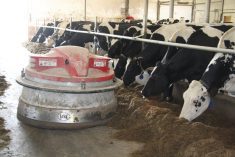TABER, Alta. – In Monte Smith’s experience, every crop has a market.
“I don’t think there is anything that isn’t marketable,” he told an organic growers’ meeting in this southern Alberta community.
Meeting buyer specifications, however, is another matter.
Smith is head trader for organic crops with Newco Commodities in Coaldale, Alta., and has been involved in organic grain sales for about 25 years.
He has found that every season offers different prices and demands.
“If you want to market your grain, call us. If you want to sell it, call the elevator.”
Read Also

Manitoba extends Crown land rent freeze
Manitoba government links the continued rental rate freeze on grazing and forage leases to economic and environmental challenges facing the industry
His company finds buyers for grain and oilseeds and ships mostly to American millers.
He has drawn grain from as far away as the Peace River district and shipped it as far as California.
Smith said farmers are one of the biggest obstacles in the organic market because they tend to be secretive.
“Nobody wants to tell anybody what they’ve got,” he said.
“Everything gets tucked away and they come forward when they need money.”
When selling a crop, Smith requires a representative sample. If buyers are dissatisfied, they won’t come back.
“If you doctor the sample, it’s you who will take the hit in the end, not me.”
He said he has seen shipments in the past that couldn’t be used in an organic mill because they had too many weed seeds, ergot, dead bugs, dead birds and mice.
Farmers also need to get tests done in advance for protein levels and falling numbers. Customers could go elsewhere if they take too long.
As well, paperwork must be in place identifying the organic certifying organization. In some cases, incomplete or absent paperwork has held up business for months.
If a sale is delayed while buyers wait for certification information or other documents, they will not likely do business again.
When the product is ready for shipment, farmers are responsible for checking the trucks. For example, they must be washed if they have hauled fertilizer. They won’t be loaded if they’re not clean.
As for market demand, Smith said every year is different, making it difficult to offer planting advice. Prices and demand rise and fall. As well, farmers need to remember not to base this year’s planting decisions on last year’s prices.















